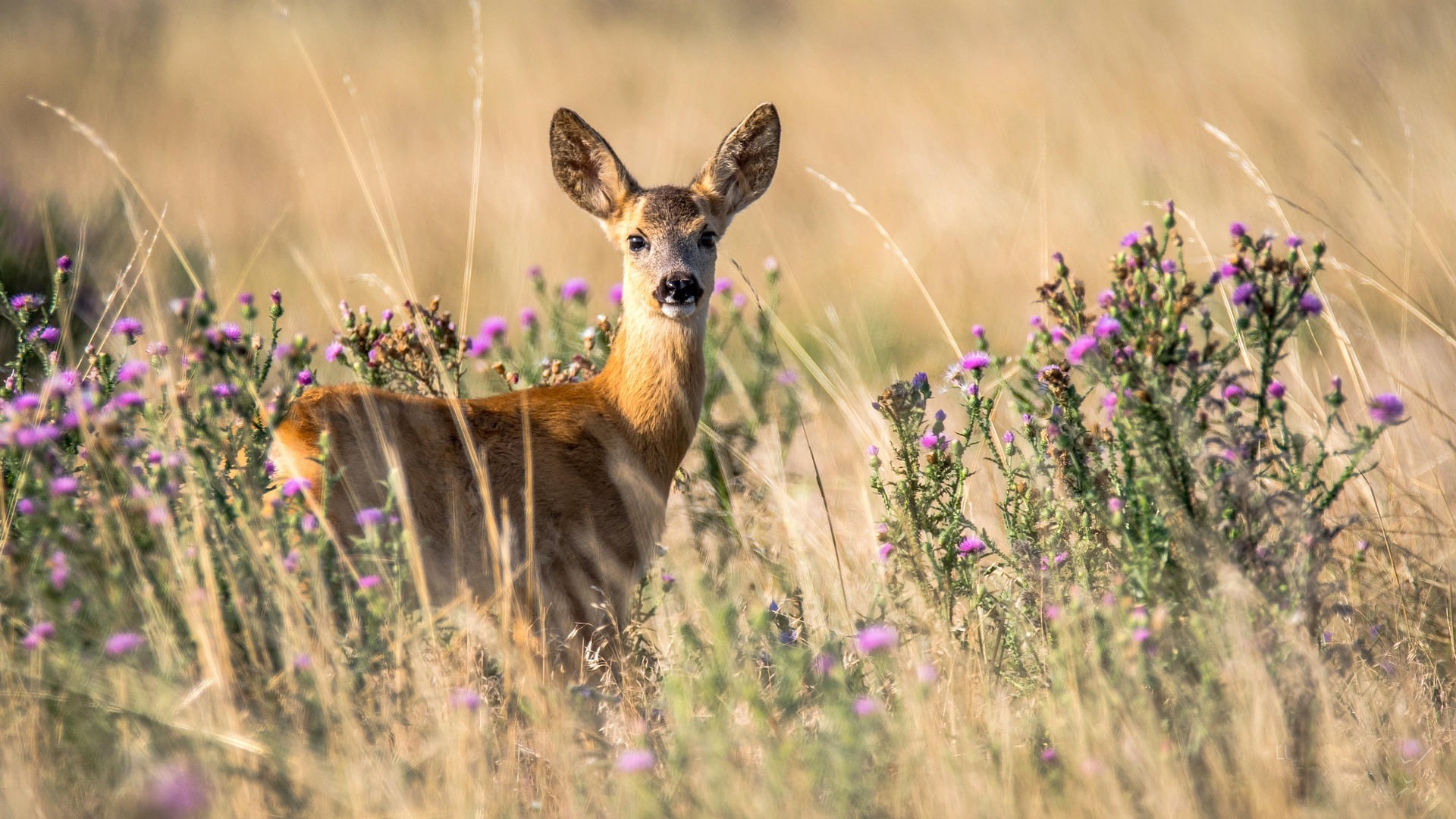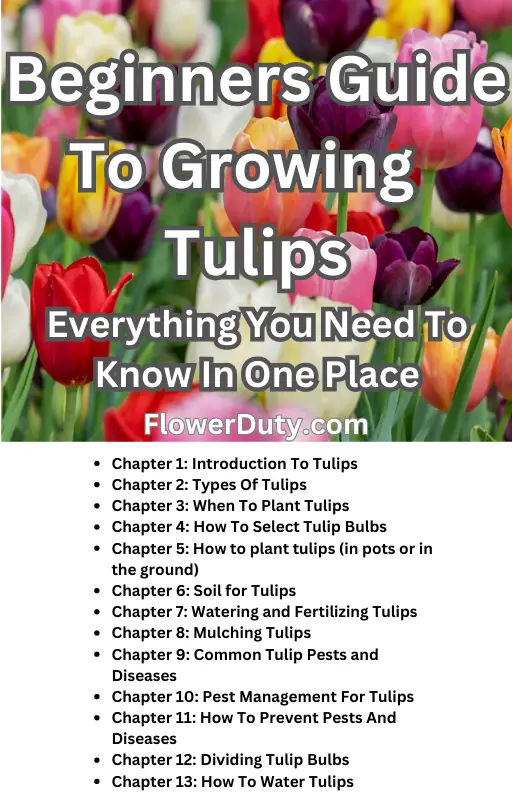Tulips often fall victim to deer, they either eat the flowers or the entire plant. Most tulips will survive if deer eat their buds or flowers, but if the deer also eat their leaves, then they are less likely to survive.
Deer resistant tulips usually have a bitter taste, foul smell, and variegated or hairy leaves, which the deer tend to avoid. The best deer resistant tulips are Darwin Hybrid, Kaufmanniana, Fosteriana, Greigii, Lily Flowered, Biflora, Kolpakowskiana, and Linifolia tulips.
If deer are constantly eating your flowers and plants, then my personal recommendation is to use a deer repellant that remains effective even during rain Click here to check it out on Amazon.com
There are no full proof deer resistant tulips because almost nothing will stop a hungry deer. Deer are in fact attracted to flowers, and when they see a beautiful flower garden, they usually see food. The main reason why deer seem to be attracted to tulips is because the tulip flowers are jam packed with nutrients. If the deer are hungry enough, might even dig up shallow planted tulips and eat the bulbs.
The good news is that there are serval types of tulips that are considered to be deer resistant. Deer resistant tulips usually have one or more characteristics that these animals simply hate, like the bitter taste.
Deer Resistant Tulips
Deer-resistant tulips are varieties that are less appealing to deer and less likely to be browsed or damaged by them. While no tulip is completely deer-proof, there are certain characteristics that make some tulips less attractive to these animals. Typically, deer-resistant tulips have strong fragrances, bitter or unpleasant tastes, or tougher foliage. These tulips often have a higher concentration of natural compounds, such as alkaloids or terpenes, which deter deer from feeding on them.
Some popular deer-resistant tulip varieties include ‘Menton’, ‘Purple Prince’, ‘Queen of Night’, and ‘Maureen’. To further protect tulips from deer, it is recommended to plant them in conjunction with deer-resistant plants, apply deterrents or repellents, or install physical barriers like fences or netting. While deer may still occasionally sample deer-resistant tulips, these varieties provide a better chance of enjoying beautiful blooms without significant deer damage.
Earn a 50% Commission on each sale by simply sharing my guides with friends and family on social media, check out Flower Duty Affiliates
Darwin Hybrid Tulips
Darwin Hybrid Tulips have relatively large flowers, with vibrant colors and most importantly a sturdy stem. The stem of these tulips is much stronger than the stem of most tulips, and due to these strong stems is why deer tend to ignore them. Deer are not that fussy eaters, but if they have the opportunity to eat some other plants that have weaker stems, then they will avoid munching on plants that have stronger stems.
Darwin Hybrid Tulips that I would highly recommend are the Apeldoorn, Oxford, and Golden Apeldoorn. If you want to know what blue tulips mean, then check out my recent article Blue Tulips Meaning ( Secret Meanings & Symbolism ).
Kaufmanniana Tulips
Kaufmanniana Tulips are also known as Waterlily Tulips, they have variegated foliage and fairly large flowers. Kaufmanniana Tulips are deer resistant due to their variegated foliage, which apparently has a fairly nasty taste, mostly bitter. The Kaufmanniana Tulips that I would highly recommend are the Johann Strauss, Stresa, and Heart’s Delight.
Fosteriana Tulips
Fosteriana Tulips are also known as the Emperor Tulips, and once you take a look at them you will know why. Their flowers are cup shaped and have vibrant colors, which is ideal for a garden and they are also deer resistant. Deer tend to avoid these plants because Fosteriana Tulips have a bitter taste and a foul odor for the deer. Deer avoid these tulips so much, that you can protect your more vulnerable plants with them by strategically planting these tulips.
The Fosteriana Tulips which I highly recommend are the Red Emperor, Orange Emperor, and Purissima. If you want to know what green tulips mean then check out my recent article Green Tulips Meaning ( Symbolism & Secrets ).
Greigii Tulips
Greigii Tulips have variegated foliage and relatively short stems. Deer seem to avoid these tulips because of the variegated foliage and due to their taste. The Greigii Tulips which I highly recommend due to their beauty and deer resistance are Red Riding Hood, Toronto, and Calgary.
Lily Flowered Tulips
Lily Flowered Tulips are not only deer resistant but also extremely beautiful due to their lily shaped flower petals. These tulips do not produce a strong odor or have a bitter taste for the deer but they will usually just ignore these tulips. Most likely the shape of the flowers is what stops the deer from eating them, unfortunately, this means that deer might eat them before these tulips flower.
The Lily Flowered Tulips that I would highly recommend are the Ballerina, West Point, and White Triumphator. If you want to know what black tulips mean, then check out my recent article Black Tulips Meaning ( Secret Meanings & Symbolism ).
Biflora Tulips
Biflora Tulips are also known as species tulips and they are considered to be deer resistant. Biflora tulips are rather strange, relatively short at around 4-5 inches with beautiful flowers. Deer seem to avoid them because they either produce a foul smell or because they simply taste bad.
Kolpakowskiana Tulips
Kolpakowskiana are also known as species tulips, not only these are deer resistant tulips but also rodent resistant. Kolpakowskiana Tulips are thought to have a bitter taste for deer, this is why they avoid them, although if you look at these flowers they tend to look rather fragile.
Linifolia Tulips
Linifolia Tulips are also known as Bokhara or Botanical tulips, they have smaller less showy flowers, but they are still beautiful. Linifolia Tulips have a very bitter taste for the deer, although if they are hungry enough they might nibble on the flowers. Just keep in mind that these tulips are deer resistant, and not deer repellant, so you can not plant them among other flowers to protect them from deer.
Key Takeaways
- Deer resistant tulips are Darwin Hybrid, Kaufmanniana, Fosteriana, Greigii, Lily Flowered, Biflora, Kolpakowskiana, and Linifolia tulips.
- Tulips that are considered to be deer resistant usually have a bitter taste, produce a foul odor, and have hairy or variegated leaves.
- Even though some tulips are considered to be deer resistant, they still might be damaged by a hungry deer.

